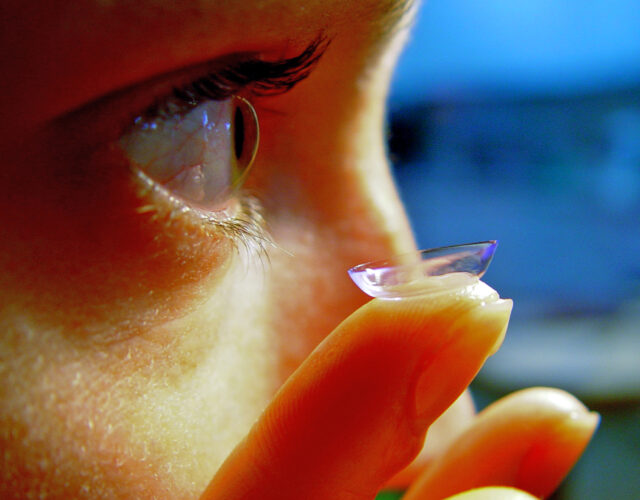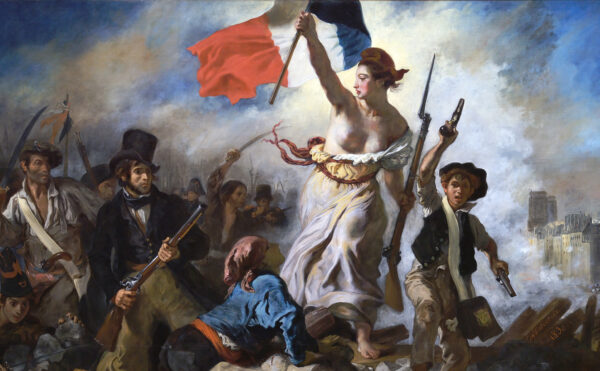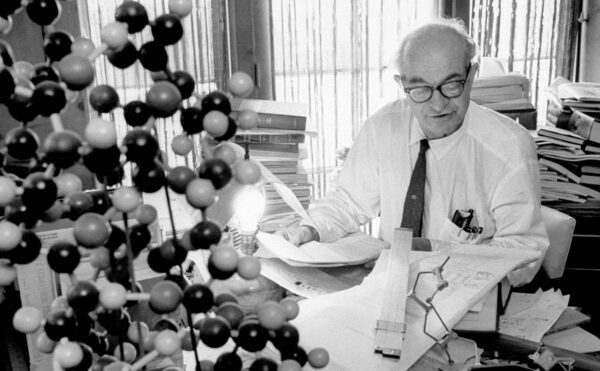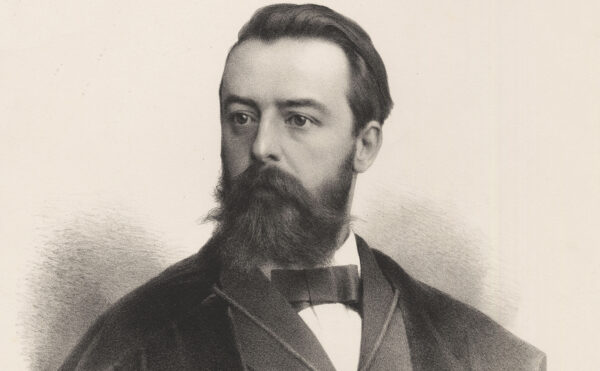In the early 1950s in Czechoslovakia two men struck up a conversation on a train to Prague. One man was a chemist, the other an ophthalmologist. The chemist, reviled as the bourgeois son of a capitalist factory owner, listened as his new acquaintance detailed his patients’ difficulties with their artificial eyes and other metal ocular implants. The chemist had an idea: use a material that could mimic the properties of human tissue. Unfortunately, no such thing existed.
Any eavesdropping secret police would have heard nothing to alarm them, though the ultimate consequences of the conversation affected millions of people around the world and sparked an industry that today is worth billions of dollars.
This story possesses the classic elements of a 20th-century political thriller: Nazi villains, arrests by secret police, and fear of Soviet invasion. Its imperfect hero is Otto Wichterle, a stubborn, outspoken chemist who on Christmas Eve 1961 created the soft contact lens in his Prague kitchen.
Wichterle, the son of a factory owner whose company produced farm machinery, was born in 1913 in a small town in Moravia, then part of the Austro-Hungarian Empire. As a child Wichterle was preoccupied with a love of tennis and classical literature and languages. Heart trouble and fever prevented him from attending school for much of his youth, but rigorous homeschooling and his natural intellect allowed him to flourish.
He enrolled at Prague’s Institute of Chemical and Technological Engineering in the early 1930s. This was the time of the Great Depression, and Wichterle became engaged in the university’s political debates, speaking out against the policies he felt had crippled his country (since renamed Czechoslovakia) during the post–World War I period. Like many of his peers, he was strongly sympathetic to left-wing causes and went so far as to visit the Soviet Union in 1933.
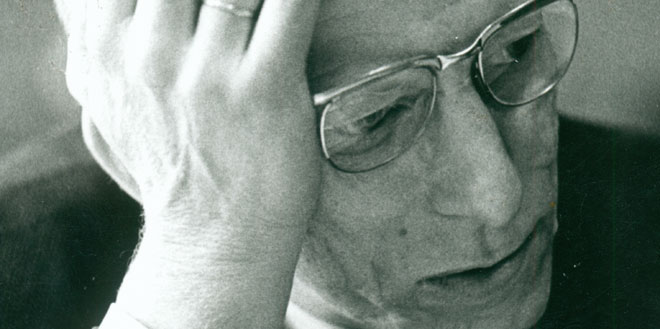
Wichterle stayed on at the university as a researcher and teacher after receiving his doctorate in 1936. But Fascism soon fanned out across Europe. After Hitler installed a Nazi puppet regime in Prague, scientific work ground to a halt. Educational institutions closed, and Wichterle, tarred with a history of left-wing student activism, feared for his safety as the new regime imprisoned fellow academics in concentration camps. But all appeared well, at least for a time, when the Bat’a Shoe Company—famous for being the first European firm to mass-produce footwear—offered him a job as a researcher. Wichterle flourished at Bat’a. He continued to write and publish, even giving chemistry lectures to fellow workers. In 1941 he created a synthetic fabric called silon, a fiber similar to nylon. Then the Gestapo caught up with him.
Why the Gestapo arrested Wichterle is unclear. He may have been organizing secret meetings to discuss banned books, or the Gestapo may have suspected him of hiding research from the Nazis. Regardless, he proved stubbornly uncooperative. In 1942 he was jailed for nearly six months, escaping a longer sentence only through the intervention of Wolfgang Langenbeck, one of the most famous organic chemists in Germany at the time.
After the war Wichterle returned to school in Prague to pursue his second doctorate, this time in organic chemistry. He published a number of chemistry textbooks and continued with some of his Bat’a experimental work before world events again intervened. In 1948 the Communist Party of Czechoslovakia, with Soviet backing, seized control of the state, which became part of the emerging Communist bloc.
Wichterle was turning into a well-respected chemist, but his outspokenness soon attracted unwanted attention. The new authorities’ goal of establishing a dictatorship of the proletariat meant those from middle-class backgrounds were under immediate suspicion. Despite his left-wing activities during his student years, Wichterle’s status as the son of a factory owner damaged his reputation. Wichterle flatly refused to make political amends by joining the Communist Party and even openly criticized it. At a meeting for teachers in 1952 Wichterle stood up and opposed the party’s approach to education, arguing that learning should be driven by passion and desire rather than dictated from above. The party wanted well-trained builders of Communism, but Wichterle, ever the homeschooled individualist, saw education as a personal journey. Much of the audience applauded, but party members responded harshly, with one bringing Wichterle’s remarks to a close with the chilling conclusion that he “could not understand how it was possible that a son of a capitalist could speak at this meeting.” Wichterle, by then a full professor in macromolecular chemistry at Prague’s School of Chemical Technology, wasn’t allowed to reply.
The secret police targeted Wichterle. Despite time spent in a German-run prison, his investigators suspected him of wartime collaboration. Agents with the StB (Státní Bezpečnost, the Czech equivalent of the KGB) cited his education, cultured manners, and love of tennis (a distinctly Western and bourgeois pastime) as evidence of his political unreliability. Worse still, the StB believed Wichterle to be more favorably inclined toward the United States than the Soviet Union. At the time of the Red Army’s liberation of Prague at the end of World War II, Wichterle, according to the secret police, remarked that “it would have been better if the Americans had come first.”
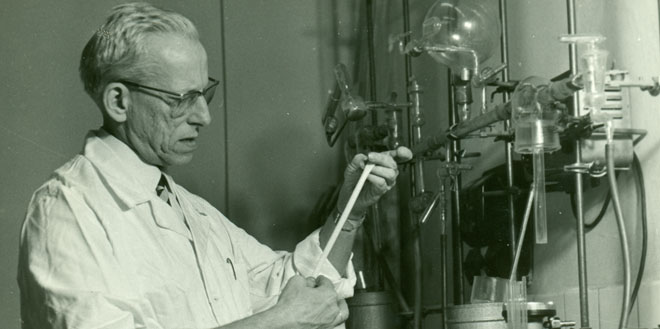
Communist authorities banned Wichterle from travel abroad yet allowed him to continue his work. The inventor of silon and holder of more than 60 other patents was an indispensable resource for a government that planned to rapidly expand Czechoslovakia’s industrial base, even when that inventor was an outspoken capitalist’s son who represented everything the new rulers detested.
Wichterle met the ophthalmologist on a Prague-bound train during this stressful period. As the two men discussed patients’ complaints about the discomfort of rigid ocular implants, Wichterle was struck by a possible solution: a water-swelling (hydrophilic) gel. Such a gel, being both flexible and permeable, would provide far more comfort than either metal or plastic implants. No such substance existed, but the conversation prompted Wichterle to think about humans and their eyes, and what sort of material would work best with both.
Wichterle’s stubbornness now proved a scientific asset rather than a political liability. Alongside his lab assistant Drahoslav Lím, Wichterle spent the next several years researching what would become known as hydrogels. In the middle of the 1950s the two men succeeded in developing polyhydroxyethyl methacrylate (polyHEMA), the first flexible, soft, clear, hydrophilic gel. By the late 1950s the pair knew they had found something special. Plastics, which were increasingly being used for implants, were far less compatible with the human body than hydrogels, which are structurally much more similar to human tissue. (The international scientific community agreed; Nature published their work in 1960, and scientists began discussing potential uses for hydrogels.)
Wichterle’s reputation as a leader in the field of polymer chemistry grew, but he struggled to create a functional application for hydrogels. Both Leonardo da Vinci and René Descartes had thought up the idea of contact lenses, though only in the late 19th century did they first appear. Early models were both large and hard, and even when blown-glass lenses gave way to acrylic plastic, users complained of severe discomfort after prolonged wear. Acrylic lenses starved the eyes of oxygen, leading to intense dryness, and such problems prevented the widespread adoption of contact lenses. Wichterle had invented a substance that addressed these earlier problems, but he could not get his new material to behave. His trial lenses were unwearable: they had irregular edges and frequently tore when handled.
Wichterle eventually persuaded a party boss to drop the international travel ban on the grounds that it was intellectually wasteful. Soon after, Wichterle traveled to a conference in Israel where he met Herman Mark, regarded by many as a founding father of polymer chemistry. At Mark’s request (and with party permission) Wichterle organized a massive meeting of the International Union of Pure and Applied Chemistry (IUPAC) in Prague in 1957. Simultaneously translated into four languages for the more than 1,000 attendees, the symposium proved vital in ending the isolation under which many Eastern-bloc scientists labored and was an important step in building research and personal networks between East and West. As chief organizer of this grand success, Wichterle should have been lauded. Instead he was fired.
The party’s 1958 purge of Wichterle came down to the personal and the political: the chemist’s stubborn outspokenness and the party’s view of him as an enemy of the people. Not only did he disagree with his university’s (and Moscow’s) approach to learning; he had also made no friends with his refusal to grant passing grades to the children of several influential party members, insisting that they earn their grades through hard work and intellectual merit rather than nepotism. Such “political unreliability” could not be tolerated. Wichterle, along with hundreds of other suspect academics, was fired as the party attempted to establish ideological purity within the university system.
Yet Wichterle did not remain in the cold for long. A few within the ruling class recognized his abilities and offered some protection. Wichterle was privately well liked by some members of the party establishment and, more important, his unusual genius could still be tapped to benefit the state and show the world what Marxist-Leninist science could achieve.
In 1959 he founded the Institute of Macromolecular Chemistry within the Czechoslovak Academy of Sciences. The construction of the new institute did not run entirely smoothly. Wichterle, frustrated with delays, reportedly paid from his own pocket for rum to bribe the builders. But the final result was stupendous. Institute scientists received healthy salaries, labs were equipped with new machinery and technology, and a dedicated cadre of graduate students helped create a convivial atmosphere.
Despite this success Wichterle’s research soon hit a series of roadblocks. Although the Academy of Sciences was proud to support basic research on polymers, their regulations forbade exploration of real-world applications. Wichterle’s brilliance in codeveloping polyHEMA had garnered him the reputation and respect necessary to form the Institute of Macromolecular Chemistry, but the institute’s location within the Academy of Sciences meant that he was forbidden to use its facilities to investigate the practical applications of his discovery.
Wichterle, as ever, was undeterred. On Christmas Eve 1961 he sat down at his kitchen table, determined to come up with a wearable soft contact lens. His ingredients: his son’s toy construction set, a hot plate, and a motor.
First he constructed a base built from his son’s Merkur set (similar to Meccano or Erector toys) and connected it to the hot plate. To power this contraption he disassembled his gramophone and tore out the motor. Finally, he attached glass tubing and handmade molds. This seemingly primitive machine introduced liquid polyHEMA through the tubes into the molds while the motor kept the molds continuously spinning as they gathered heat from the hot plate. Over the next day he manipulated his contraption and, in time for Christmas dinner, successfully shaped hydrogel into wearable lenses. He tested the lenses on himself and found them comfortable (although wrong for his prescription). He had created the first practical alternative to acrylic and blown-glass lenses.
On Christmas Eve 1961 Wichterle sat down at his kitchen table, determined to come up with a wearable soft contact lens. His ingredients: his son’s toy construction set, a hot plate, and a motor.
The key was spin casting. This technique allowed Wichterle to control the shape and thickness of the material, avoiding the irregular edges and fragility of his previous attempts. Permeability gave the lens its comfort: being hydrophilic, carbon dioxide could easily escape and oxygen could be let in. (Since the cornea does not possess any blood vessels, it relies directly on air for its oxygen.) With the hydrogel-based contact lens the eye could now “breathe.” Over the next few weeks Wichterle and his wife, Linda, produced thousands of the lenses using the homemade spin-caster. Wichterle also filed for a patent, although under Czechoslovak law state agencies controlled the sale of patent rights.
Once authorities caught wind of his invention, they warmed, albeit mildly, to the idea of Wichterle using his institute to improve the lens design. He urged the government to sell the patent before the discovery was replicated elsewhere, not for the money (Czechoslovakia capped how much an inventor could earn through patents) but for the recognition and for the benefit of his institute. The agency in charge of intellectual property had little appreciation of the revolutionary potential of Wichterle’s invention, and it sold the patent to a Harrisburg, Pennsylvania, ophthalmologist for a relative pittance. The ophthalmologist then sold the patent to an American company, the National Patent Development Corporation, which then licensed it to Bausch and Lomb. In 1971 the FDA approved Bausch and Lomb’s mass production of soft lenses, and a multibillion-dollar industry was born. Neither Wichterle nor the Czechoslovak state made a dime.
Wichterle didn’t care much about missing out on a fortune. What aggravated him was Russian scientists’ condescension toward work being done by colleagues in the Soviet satellite states. In his outspoken manner Wichterle made a series of disparaging remarks throughout the 1960s, criticizing his Soviet counterparts especially for their aloof attitude, which destroyed any spirit of cooperation among members of the Communist bloc. As he later recalled, “The Soviets—from their position of occupying power—could limitlessly exploit us and profit from the results of our research,” yet remarkably “this one-sided cooperation remained without any significant or practical results.” Wichterle shared his feelings with a group of Soviet scientists, who first offered to remedy some of his complaints but then banned him from participating in their scientific conferences.
The Czech chemist was not alone in venting anti-Soviet frustrations. In the mid-1960s Czechoslovaks increasingly voiced their frustration with the Soviet Union’s domination of their country. Their economy had suffered greatly, while post-Stalin reforms were moving at a snail’s pace. Prominent writers criticized the government, and students protested against their living conditions. In 1968 a reform-minded party member named Aleksander Dubček was selected as the new party leader. He in turn launched a campaign of liberalization with the slogan “socialism with a human face.” The Prague Spring reforms ended press censorship, allowed freedom of association, and aimed to decrease Czechoslovak reliance on other countries within the Soviet sphere of influence.
Wichterle played an active part in the reforms. A social man by nature, he had cultivated relationships with many anti-party activists within the artistic and scientific communities. He took part in the newly established independent Union of Scientific Workers (which aimed to counter the party-dominated Academy of Sciences) and joined the bourgeoning Society for Human Rights. When the new constitution created a parliament known as the Czech National Council, Wichterle was elected to office. Crucially he was also among 70 of the most celebrated Czechoslovaks to sign the “Two Thousand Words,” a manifesto against the Communist Party’s control and handling of the country over the previous decades. Published in June 1968, the “Two Thousand Words” contributed to the backlash to and ultimate crushing of the Prague Spring. Eight weeks later, despite massive nonviolent protests, Soviet tanks rolled through the streets of Prague as the combined forces of the Warsaw Pact invaded. Dubček was deposed and the reforms undone.
Heavy repression followed, especially for those, such as Wichterle, deemed leaders of the anti-Soviet movement. More than 100,000 Czechoslovaks emigrated, largely as refugees. During the occupation Wichterle left (clandestinely) for Toronto to attend a meeting of IUPAC. As chair of the macromolecular division, he relished the opportunity to speak about the Prague Spring before a large, captive audience. He praised the work of IUPAC, especially for helping scientists in “isolated” countries, and received a standing ovation. Herbert Morawetz, based at the Polytechnic Institute of Brooklyn, offered Wichterle a job to protect the scientist from Soviet and Czechoslovak authorities. The Swiss authorities also offered sanctuary with the promise that they could make Wichterle “disappear” through a fake climbing accident. He refused these offers. Despite his harsh criticisms of the Soviet regime, Wichterle clung to the belief that life in Czechoslovakia would change for the better, and he was eager to participate. After the conference he planned to return to his institute and continue his research.

The party, rebuked by Moscow, had other ideas. Along with the other signatories to the “Two Thousand Words,” Wichterle faced the choice of either revoking his signature or being punished. He refused to withdraw his name and soon faced measures designed to isolate him. In 1971 he was removed as director of the Institute of Macromolecular Chemistry. He could no longer travel to the many international conferences that requested his attendance. Party members called him a “counter-revolutionary,” and once again the secret police shadowed him. One of the greatest Czechoslovak scientists and a true innovator in polymer chemistry seemed destined to spend his remaining years under Communism and in forced semiretirement, unable to perform meaningful research.
One of the greatest Czechoslovak scientists and a true innovator in polymer chemistry seemed destined to spend his remaining years under Communism and in forced semiretirement, unable to perform meaningful research.
In 1989, with the rest of Eastern Europe, Czechoslovakia demanded an end to the status quo. People took to the streets, calling for an end to shortages, to political repression, to secret police, to travel bans, to seemingly arbitrary laws, and to the rule of the few over the many. The bloodless Velvet Revolution ended decades of Communist rule. Free elections were called. Overnight, Wichterle turned from persona non grata to Czech hero. Czech television aired a previously banned documentary celebrating his life. He was unanimously elected president of the Czechoslovak Academy of Sciences—the organization that while under party control blocked his research. Finally he was able to speak his mind as much as he liked without any fear of political repercussion.
With no one and nothing to oppose, Wichterle lived out the rest of his days peacefully. When he died in 1998, a bronze tree was erected at the entrance to his former institute. The more than 150 branches each represent one of the patents registered in his name, including the soft contact lens. The stubborn chemist, though, never gave up his own glasses.

